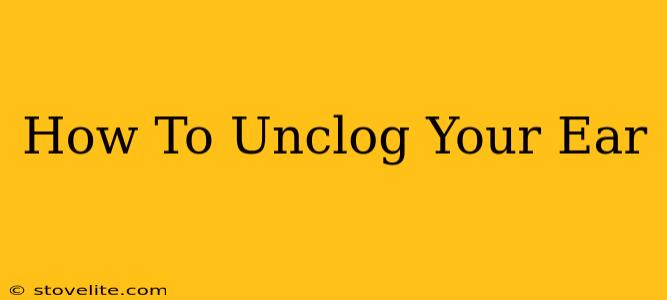Having a clogged ear can be incredibly frustrating, causing discomfort, muffled hearing, and even pain. Fortunately, many effective methods can help unclog your ear at home. This guide explores safe and effective techniques to alleviate ear blockage and restore your hearing. Remember, if you experience severe pain, persistent blockage, or any signs of infection (fever, pus), consult a doctor immediately.
Understanding Ear Blockage
Before diving into solutions, it's helpful to understand what might be causing your clogged ear. Common culprits include:
- Earwax buildup: Earwax, while naturally protective, can accumulate and block the ear canal, leading to muffled hearing.
- Fluid buildup: This often occurs after swimming, showering, or experiencing an upper respiratory infection. The fluid can trap air, causing pressure and discomfort.
- Foreign objects: Small objects, like insects or small pieces of debris, can become lodged in the ear canal.
- Eustachian tube dysfunction: This tube connects the middle ear to the back of the throat. If it becomes blocked, it can lead to fluid buildup in the middle ear.
Safe and Effective Home Remedies for Clogged Ears
Note: Avoid inserting any sharp objects into your ear canal, as this can cause damage or further blockage.
1. Gravity and Time: The Simplest Solution
Sometimes, the simplest solution is the best. Try tilting your head to allow gravity to help drain excess fluid from your ear. This is particularly effective if you suspect fluid buildup from swimming or showering. Give it some time; sometimes, the blockage will resolve itself.
2. Warm Compress: Soothing Relief
Applying a warm compress to the affected ear can help soften earwax and ease discomfort. Simply soak a clean washcloth in warm water, wring out excess water, and apply it gently to your ear for 10-15 minutes.
3. Saline Solution: Gentle Flushing
A saline solution can help dislodge earwax and debris. You can purchase pre-made saline nasal spray or create your own by mixing 1/4 teaspoon of salt in 8 ounces of warm water. Using a clean dropper or syringe (available at most pharmacies), gently irrigate the ear canal. Never force the solution. Let it drain naturally.
4. Yawning and Swallowing: Eustachian Tube Maneuvers
These actions can help open your Eustachian tubes, relieving pressure and potentially clearing a blockage. Try yawning widely or swallowing repeatedly, perhaps chewing gum, which can also stimulate this process.
5. Hydrogen Peroxide: Use with Caution
Some people use hydrogen peroxide to soften earwax. If you choose this method, use a low concentration (3%) solution. Add a few drops into the ear canal, wait a few minutes, then tilt your head to allow it to drain. Do not use this method frequently, as it can irritate the ear canal. It is advisable to check with your doctor first before trying hydrogen peroxide on your ears.
When to See a Doctor
While home remedies can be effective, it's crucial to seek medical attention if:
- You experience severe ear pain.
- Your hearing loss persists or worsens.
- You notice any discharge from your ear (pus or blood).
- You have a fever.
- You suspect a foreign object is lodged in your ear.
- Home remedies haven't provided relief after a few days.
Your doctor can safely remove impacted earwax or address any underlying medical conditions contributing to your ear blockage. Early intervention can prevent complications.
Remember, taking preventative measures like avoiding excessive cotton swab use and carefully drying your ears after showering or swimming can help minimize the risk of future ear blockages. Prioritizing ear health ensures optimal hearing and overall well-being.

